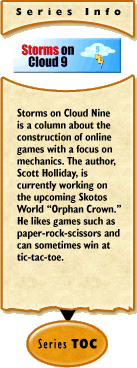
A Case for Complexity?by Scott Holliday
Problem One: the need to 'keep up with your friends', 'advance', or 'get ahead', requires you do certain tasks. This is where you could head boredom off at the pass. No advancement or no tasks required - players now do whatever they want instead of following your program for their lives. As a simple test, find something fun to do in your game that isn't otherwise rewarding. Now look to see what percentage of your population is instead 'power-levelling.' So is your game about having fun, or is it about 'power-levelling?' If the latter, what will they do after they've reached the top? The sorriest solution is to simply make the top harder to get to... Problem Two: the task required (or the game itself) is not fun. The first problem often leads one to get stuck in otherwise meaningless (and boring) activities. How many MMOGs have the ability to mine/farm/fish/collect wood? How many are there in which this is NOT just a repetitive clicking of the mouse based on the computer response? (*Clunk* *click* *Clunk* *click* *Clunk* *click*) I bet you're just boiling with excitement at the thought. Of course, the most common alternate method is the 'wait until you finish' method. (*click* *Clunk* *Clunk* *Clunk* *Clunk*) This is otherwise known as the 'very expensive screensaver.' My thought is this is where the developer should put in the 'simple and relaxing' aspect. Perhaps crafting (and crafting skill) could be represented by a simple mini-game. Right now, you're probably thinking, 'play Tetris to mine faster.' Yes, it sounds silly... but would it be more interesting? Problem Three: to succeed at the required task (or the game itself) requires unmerciful complexity. It seems like many MMOGs lately are tending more toward 'have fun doing your tax forms online while paying for it.' Ok, I must admit, I like charts and tables. However, if the charts and tables ARE the game, you have a problem. Likewise, if you have to go crunch numbers on your own spreadsheet to 'build a better character', something seems very wrong. I'm not against a little bit of planning. However, the fallacy is that there ARE solutions that excel enough to make it worth the time. In a truly balanced game, whatever you decide on randomly would be equally interesting/viable. Problem Four: you are required to deal with other people. This complaint is actually game specific, so I might need to explain. Many MMOGs require that you collaborate with other people to be successful. From the developer's point of view, it makes a lot of sense. By encouraging players to interact, they are more likely to form friendships and eventually a community. Sounds good. The problem is in how strongly this encouragement is enforced. I agree that small bonuses are helpful. However, when you require that players interact, what happens when they don't want to? What happens when they can't find other players that aren't already attached? At minimum, they give it a break and go have fun elsewhere. This is otherwise known as, 'losing the customer.' They might be back later... assuming they don't find something they like better. [ <— #21: Choice or Lack Thereof | #23: Case for Simplicity? —> ]
|
